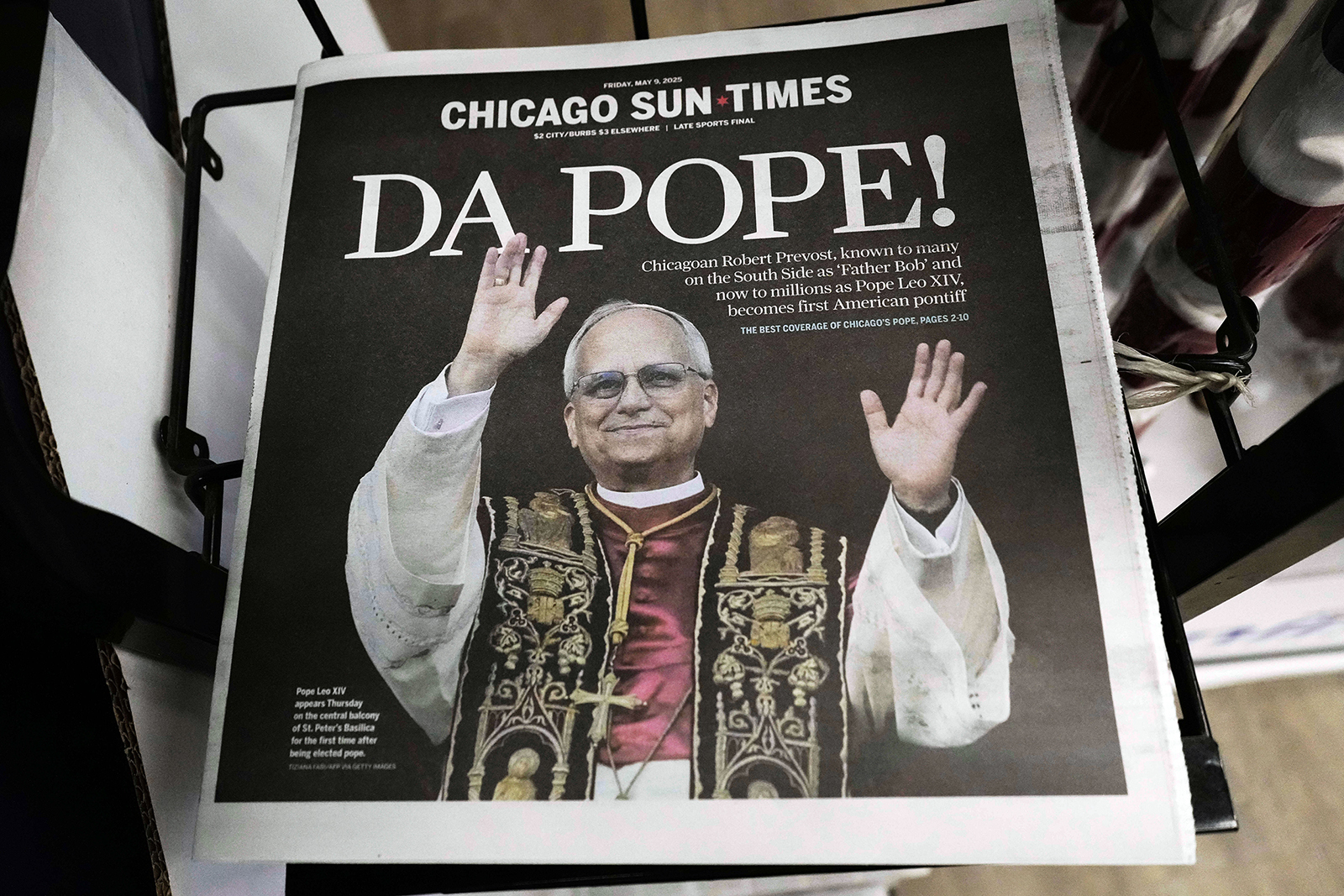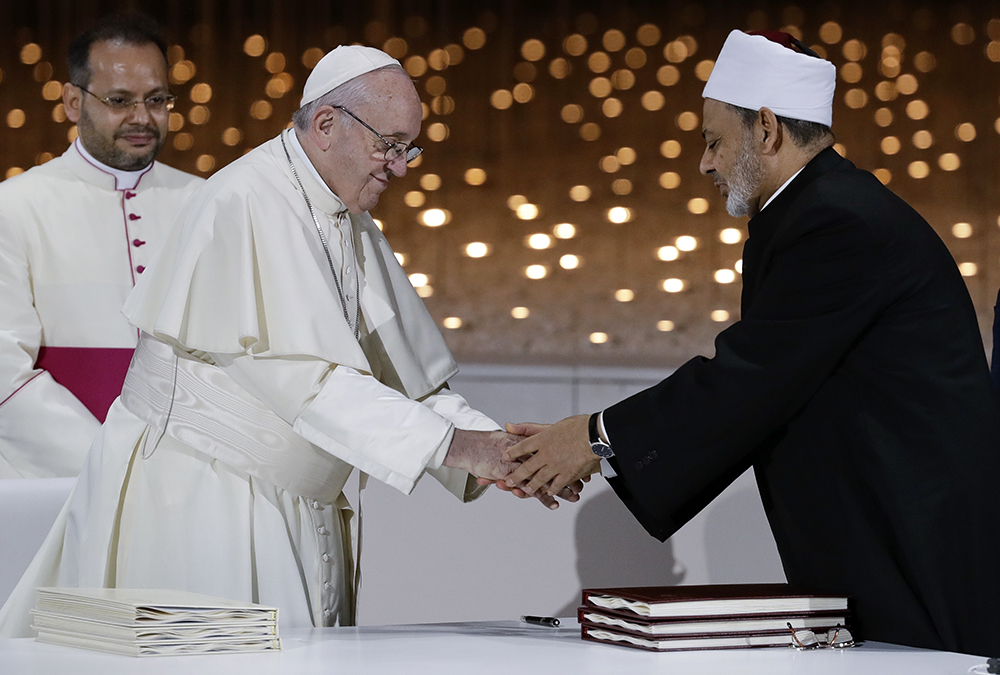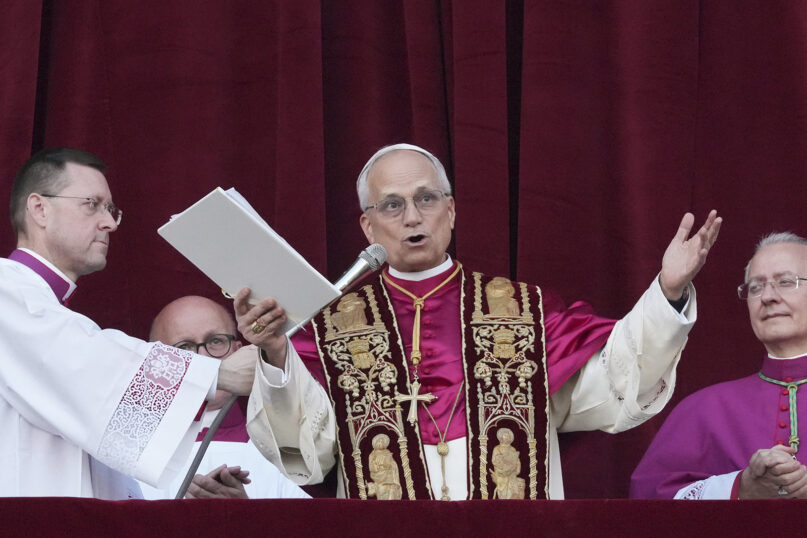
(RNS) — The announcement of the first U.S.-born pope is important for all Americans but resonates especially strongly in Chicago and its larger community, known locally as Chicagoland. Born on the city’s Southside and raised in the nearby suburb of Dolton, Robert Prevost, the man who would become Pope Leo XIV, taught in local Catholic schools and attended Chicago Theological Union before he became a missionary in Peru and began his rise in the church’s ranks.
But as he steps into the papacy, many around Chicagoland are watching to see who this native son will be as Leo XIV, non-Catholics as much as his fellow religionists, not least Chicago’s Muslims.
Recent popes have taken widely differing stances on Christian-Muslim relations. “Nostra Aetate” (“Our Time”), the Second Vatican Council’s declaration on the church’s relation to non-Christians, promulgated during Paul VI’s reign, was a revolutionary departure from centuries of polemics and hostilities against Muslims. It affirmed Islam’s monotheism, the faiths’ shared Abrahamic heritage, their veneration of Jesus and Mary and ethical alignment with Christianity.
The document reads: “… this sacred synod urges all to forget the past and to work sincerely for mutual understanding and to preserve as well as to promote together for the benefit of all mankind social justice and moral welfare, as well as peace and freedom.”
Pope John Paul II was the first pontiff to operationalize these affirmations. In 1985, he addressed young Muslims in Casablanca, saying: “We believe in the same God, the one God, the living God, the God who created the world and brings his creatures to their perfection.” In 2001, he became the first pope ever to enter a mosque, the Umayyad Mosque in Damascus, where he called for Christian-Muslim dialogue.
That same year, John Paul vocally opposed the association of Islam with terrorism after 9/11 and the war in Iraq, and the combination of theological respect and political conscience earned him deep respect among many of the world’s Muslims.
That momentum slowed under his successor, Pope Benedict XVI, whose tenure was marked by a controversy beginning when the pope publicly quoted from the work of Byzantine emperor Manuel II Palaiologus (1350–1425): “Show me just what Mohammed brought that was new, and there you will find things only evil and inhuman, such as his command to spread by the sword the faith he preached.”
The failure to contextualize, much less disavow, this statement brought protest from Muslims. Many Muslim intellectuals and clerics demanded an apology. It never came. In the aftermath of the dustup, Benedict visited the Blue Mosque in Istanbul and established the Catholic-Muslim Forum, an official platform for high-level dialogue between Catholic and Muslim leaders, but his papacy never dropped its doctrinal approach, focused more on the differences between the two faiths.
Francis revived a dynamic, justice-oriented model of interfaith engagement. The first pope to visit the Arabian Peninsula in 2019, he co-signed the “Document on Human Fraternity” with Grand Imam Ahmed el-Tayeb of al-Azhar. Two years later, he visited Iraq, where he met the Shi’a leader Grand Ayatollah Ali al-Sistani — another first.
He backed his actions with words: His 2020 encyclical “Fratelli Tutti” (“Brothers and Sisters All”) offered a sweeping vision of interreligious solidarity, drawing inspiration from his namesake, St. Francis, meeting with Sultan Malik al-Kamil in 2019. “Fratelli Tutti” framed religion as a force for peace and explicitly rejected Islamophobia.
Yet in many Muslim eyes, Francis’ lasting legacy may be his moral clarity on Palestine. He consistently called for ceasefire and humanitarian aid for Gaza, including in his 2024 “Urbi et Orbi” address. The Vatican’s Nativity scene last year mirrored Palestinian minister Munther Isaac’s “Christ in the Rubble” installation in Bethlehem. In one of his last public gestures, he repurposed the papal vehicle into a mobile clinic for Gazan children. His private gestures, such as his nightly phone calls to the Holy Family Church during Israeli airstrikes, revealed a pastoral concern that resonated deeply with Muslims worldwide.

Pope Francis greets Sheikh Ahmed el-Tayeb, the grand imam of Egypt’s al-Azhar, after an interreligious meeting at the Founder’s Memorial in Abu Dhabi, United Arab Emirates, on Feb. 4, 2019. (AP Photo/Andrew Medichini)
Before the conclave began, Faisal Kutty, a Toronto-based lawyer and law professor, wrote for Newsweek: “The next pope cannot merely preserve theological doctrine. He must preserve the moral imagination that Francis so vividly embodied. He must continue the work of reminding us that leadership is not about grandeur, but about grace.”
Echoing Kutty, Chicago-area Muslim leaders have expressed cautious hope for Leo’s continuity with Francis and his commitment to justice. Tarek Khalil, education coordinator for American Muslims for Palestine Chicago, said, “I hope that the new pope would reinstitute the same traditions that the late pope was committed to.”
Tanveer Azmat, treasurer of the World Council of Muslims for Interfaith Relations in Lombard, Illinois, noted, “The (new) pope was a very close friend of Pope Francis who spoke truth to power and was very concerned about the destitute in the human family. We expect that Pope Leo XIV will follow his footsteps. He is relatively young and American. He may be able to communicate frankly with Americans.”
In its official welcome to Leo, the World Council of Muslims for Interfaith Relations said, “WCMIR is excited to see the continuation of Pope Francis’ legacy. He spoke truth to power, stood up for the poor, and emphasized dialog with non-Christians.”
Shi’a Muslims shared these sentiments: “With the ascension of Pope Leo XIV, we pray that he continues the efforts of the late Pope Francis in bridging divides and creating opportunities for dialogue and understanding,” said Jawad Hussain, chairman of the board of Baitul Ilm Academy, a Shi’a mosque in Streamwood, Illinois.
“I think a key to this collaboration,” Hussain said, “is that both parties understand and work towards being faithful and steadfast in their beliefs while giving others the space to do the same, while coming together to advocate for the common challenges.”

Newly elected Pope Leo XIV addresses the faithful from the balcony of St. Peter’s Basilica at the Vatican, May 8, 2025. (AP Photo/Alessandra Tarantino)
Other leaders pointed to shared moral and theological grounds for interfaith work. “As a Muslim living in America, I find it heartening to see the new pope carrying on the legacy of the last — standing for peace, compassion, and the kind of humanity that brings people of all faiths closer together,” said Deena Habbal, a Muslim community advocate in Chicago.
But Chicago’s Muslim leaders emphasized that continuity is not enough. What is needed is prophetic clarity in a moment of global crisis. Imam Tariq El-Amin of Masjid Al-Taqwa, the power of Leo’s first public use of the word “peace” was profound. “That struck a chord,” he said. “At this moment globally, with so much conflict and injustice, starting with peace feels like both a prayer and a direction.”
He and others stressed the need for the pope to go beyond dialogue and embrace prophetic action. “They want a pope who doesn’t just bless the status quo, but challenges it with love and courage,” El-Amin said. Muslim youth especially, he said, have great expectations around climate, anti-racism and Palestine. “It’s not just about friendly dialogue, but collaboration that shows up in action: feeding the hungry together, standing against oppression together. That’s where real trust is built,” he concluded.
Khalil also cautioned against doing interfaith work “as normal,” despite the ongoing genocide and humanitarian crisis in Gaza: “I would emphasize the need for interfaith dialogue, so long as the pope does not engage in normalization… treating normal what is absolutely abnormal, which is what is happening right now.”
Like Chicago Catholics, Muslims in greater Chicago will not be passive observers of the new papacy. Their expectations around building (and maintaining) bridges between Catholics and Muslims, collaboration on social justice issues and opposing oppression are already well articulated. Their desire for continuity of Francis’ work is matched by their hopes for prophetic justice from the new Catholic leader. Mere gestures of goodwill will not be enough.
(Anna Piela, an American Baptist Churches USA minister, is a visiting scholar of religious studies and gender at Northwestern University and the author of “Wearing the Niqab: Muslim Women in the UK and the US.” The views expressed in this commentary do not necessarily reflect those of Religion News Service.)
